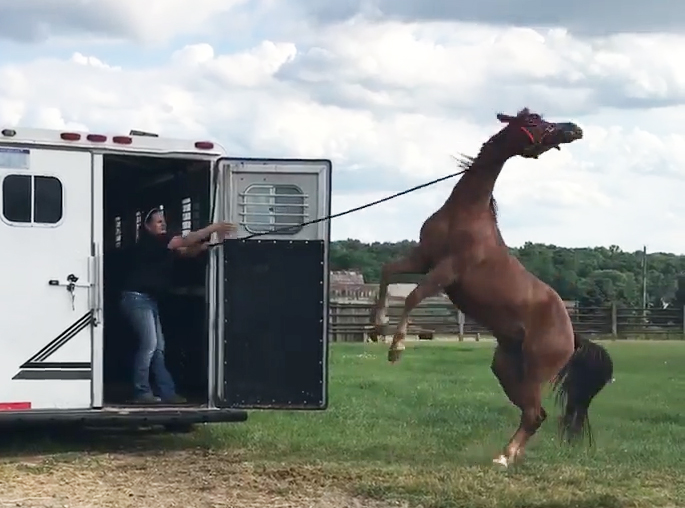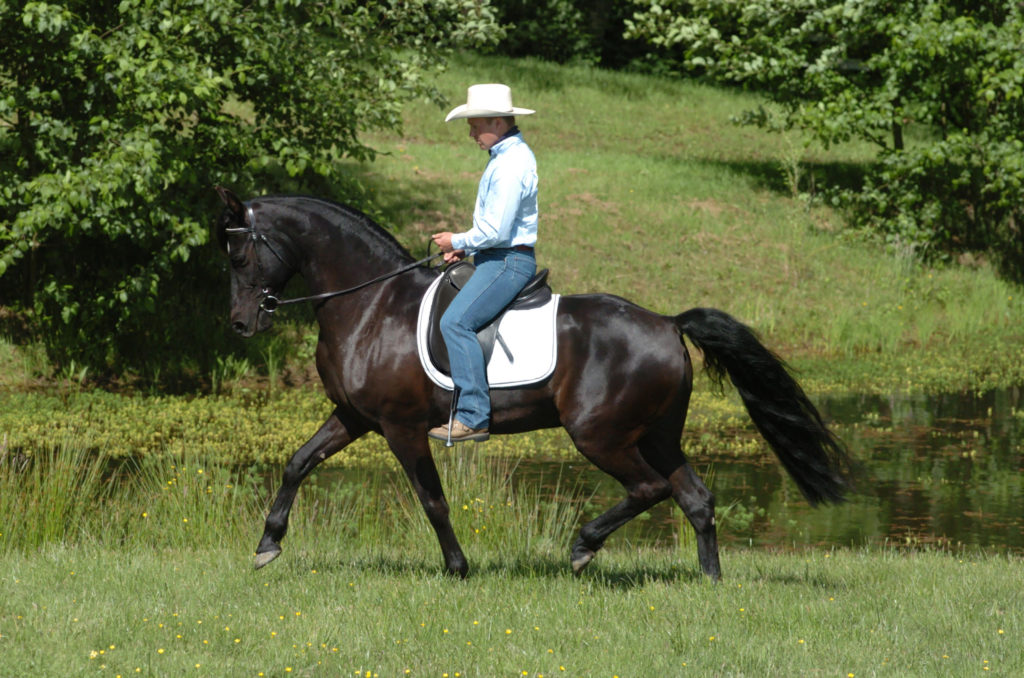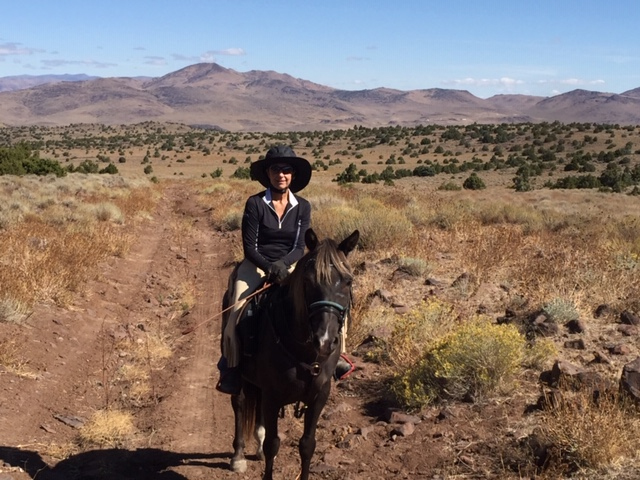In my line of work, I meet a lot of people who are struggling with their horses in some way, and sometimes in a lot of ways! While this might sound like a negative situation for those people, the fact is that the challenges our horses present often prove to be a path towards tremendous growth and learning, for both horses and people. That said, some people are in a truly difficult place where the challenges presented by their horse seem overwhelming. In this situation, people often feel deeply frustrated and possibly even afraid of their horse, and wonder if they should make the decision to find the horse another owner. In this post, I’ll give you some thoughts that might be helpful if you are finding yourself in this situation.

Sometimes, the challenges our horses present can feel overwhelming, yet I’ve often seen people make tremendous progress by simply learning to work with a more relational approach to training.
From the outside, the decision to move a challenging horse down the road may sound like a simple equation: If the horse is too much for you, you should sell the horse. In reality, the decision to part with a horse can be a difficult and heartbreaking one. We may believe we are weak because we are “giving up”. We may believe that we have failed the horse and failed ourselves. We may love the horse dearly, despite the struggles we’ve had, and it can be extremely upsetting to think of sending them away. We worry about finding the horse a good home. All of that and more can make the idea of parting with a horse anything but easy. So, how do you make the right decision?
One way to start processing what to do is to think of yourself very much as we think of a horse having to deal with some sort of new pressure. If the horse has been taught how to think through various pressures in a way that has given him the confidence to handle whatever comes at him, this new pressure is likely to be a non-issue. He may even enjoy the novelty of the experience and gain even more self-confidence from it. However, if the horse has not been given tools that allow him to process different pressures and respond to them thoughtfully, he is going to tip over into self-preservation and feel the need to flee. Now think of the challenges your horse presents for you as a form of pressure, and you are the horse having to deal with that pressure. Do you generally feel confident that you can find a way to work through the issues, or are you frequently tipping over into doubt and fear? Do the challenges seem like an opportunity to learn and become a better horseman, or are they stripping away the joy you once felt around horses?
Even if the answer is the latter, the solution may not be to sell your horse. You may simply be like that horse that feels the need to flee from pressure, meaning you just haven’t yet been given the right tools to help you work through the “pressures” your horse presents. I can tell you that there have been many cases where a student came to me feeling pretty hopeless about ever getting to a good place with their horse, only to find things changing — often surprisingly quickly — when they changed their approach and started working in a relational context. Therefore, for many people, the answer is really about getting the right help, and being okay with needing help in the first place.

I first met my long-time student Susan Kauffmann when she brought her remarkable but often challenging Morgan, Gryphon, to one of my early clinics. A trainer herself at the time, Susan recognized that her traditional approach was missing something when it came to settling Gryphon’s mind, so she went looking for new ways to help her horse. Says Susan, “Gryphon was never an easy horse, but he truly taught me the meaning of the Buddhist saying, ‘The Obstacle is The Path’. He pushed me to seek and to grow so much, and for that I am forever grateful.” Susan’s hard work with Gryphon paid off for her, for the horse, and even for me, as I ended up using Gryphon in a number of demonstrations and in this photo shoot for EQUUS magazine (photo by Robin Duncan).
It is important to remember that none of us have all the answers, and I promise you that even the best horsemen can use some advice now and again. So, if you are feeling lost with your horse, don’t be afraid to reach out to someone who has a good track record helping both horses and their riders overcome the kinds of issues you are dealing with.
But, if you have gotten what you believe to be good help, you’ve put in plenty of effort, and you still can’t get to a place where you are enjoying working with and riding your horse, it may truly be that you and your horse are not a good match. Remember, this is supposed to be fun, and if you aren’t having a good time, you can be pretty sure your horse isn’t either. Horses are extremely sensitive creatures, and they don’t enjoy a problematic partnership any more than we do. They also tend to feel our fears and frustrations, which can make them insecure and even more likely to demonstrate challenging behaviors. Therefore, while it is a hard truth, it is a real truth that hanging on to a horse we just can’t build a harmonious relationship with is usually not doing the horse any favors. And, if you are able to find someone who can be what that horse needs, you will all be better off in the long run.
Then again, if you really love the horse, you get along with them in ways other than riding, you can provide a good life for them, and you can afford it, you might also consider keeping the horse as a companion for you and your other animals. There is actually a whole movement referred to as “the non-ridden equine”, made up of people who have horses but choose not to ride them for any number of reasons. Some do other things with their horses such as trick training or liberty work. Some just enjoy hanging out with their horses and caring for them. The bottom line is that as long as the horse is happy with the life you provide, there is no right or wrong in terms of your choice to ride the horse or not.

Cindy in Nevada spent many years working hard to feel safe on her beloved yet sometimes frightening 16 hand Arabian, but finally decided to get something smaller with a quieter mind. As she explains, “I really started to feel that life was too short, and I didn’t want to feel afraid when riding anymore. I definitely had mixed feelings about getting another horse and not riding my beautiful Arabian again, but honestly, I’m having so much fun with my little Rocky Mountain Horse now that I know it was the right decision.”
If you do decide to part with your horse, please recognize that there is no failure in that. It is a brave and honest recognition that you are simply not the best partners for each other, and there is absolutely nothing wrong with that. Certainly take your time and do your utmost to ensure that your horse is going to the right home, and also take your time to find another horse and be honest in that search as well. Whatever decision process led to you having a horse wasn’t right for you, believe in yourself that you know better this time around. Again, don’t be afraid to ask for help in choosing your new equine partner, especially if you are still relatively new to the horse world. Your “right horse” is out there!

I love how you were going to get both sides of the story in many different ways in this blog…
I’m glad you enjoyed it, my friend!
Thank you so much for this! Just what I needed! I m learning so much from my coldblood Swedish trotter, been struggling for 3 years trying to understand him and to feel safe with him, and I needed to hear this! Love him so much and i will keep on with him until i can find the key to get him and me understand better from his point of wiew! Thanks Josh!🙏🏽☺🦄
I’m so glad you found this article helpful! Feel free to look through some of the other free resources I have on the website. Also, you can check out my youtube channel, you may find some videos there to help as well!
Well written Josh. So many times I wanted to give up and I was sure that my horse was not the match for me because he didn’t fit any of the charactors I had on my list, he in fact was almost the opposite. But what God taught me through the process that you have layed out so well in your blog is that sometimes we short change our self into thinking that if its comfortable then it must be right. But I am learning that as I push through what is challenging and what scares me its changing me, its forcing me to grow and be transformed into a person I didn’t know existed and I am starting to see now that this horse is perfect for me as now being changed in the challenge I have tossed out my old list because it is not fitting to me anymore! To stay the same is to miss out on who you really are!
Growth is really inevitable for us to up our game and meet a horse where they need us to be. This can be one of the hardest parts for some. It’s easy to ask the world around us to change, but to change ourselves demands deep reflection and a personal desire for growth. Well done and keep up the good work, I hope my work is able to support and help you along the way!
I sort of resonate with this article. Even though I never thought of selling my horse (as I was convinced no one else would want her) I did struggle (within myself). The reason was I was convinced she would go to someone who wouldn’t understand her and she would end up much worse than with me. Besides I loved her. I struggled for a long time with different coaches, people I thought would understand. Handling the ups and downs were not easy. Finally I just tried to figure it all out myself. That did provide me a little peace but I certainly wasn’t getting anywhere. I blamed it on my horse. ,,Then I met Josh. A whole new look of teaching and me understanding where my horse was coming from. It didn’t happen overnight and I did struggle at how slow she was changing not realizing at the time, that we both had to change. I said to Josh at one clinic….”Your teachings have nothing to do about the horse, it is all about me. From that day on I knew that it was me that had to change. I truly am now enjoying this journey and am so happy that my decision to keep her was the right one. Thank you Josh.
You have done an amazing job Barb, lots of hard work, tears, etc and the product is beautiful!
Thank you Josh. Now when I rub her head she leans into me. A simple thing but big as far as I am concerned. It is that feeling that I am working on. I want more.
You & Cierra have come so far Barb! And we always thought it was up to the horses to change. What powerful learning Josh has provided us. Thanks for sharing.
Thanks Sandy for such a nice comment. Appreciate it.
Are you having any clinics in the near future that have openings?
Dorothy,
Great question, I would encourage you to check out my website, http://www.joshnichol.com, then find the schedule page on the top banner. With our current situation, some of the clinics are being changed, which we will update everyone as we know. Where do you live?
Thanks ,Josh
That was a good read and a very non-judgmental,non-guilt approach to horsemanship and enjoying the bond between people and horses. It gives everyone the freedom to choose the horse they can enjoy as well as do the activity they love with them. We are not all cut out of the same cookie cutter,right.
Exactly Laurel, very person and every horse are different, sometimes these differences work out really well, sometimes it means we need to up our game and other times its like oil and water! The key is to sort out where we fit into that puzzle with our personal situation!
Josh is well aware of the rough start I had with Mac. The last 6 years has been a real journey and I was fortunate to seek the help of people with horsemanship skills I trusted and they also knew me well. It was a time when I had no confidence and really wasn’t sure what to do but I was willing to try.
1. I took lessons, and I mean a lot. Starting right back to basic groundwork. We did this together as it was ME who needed the work in order to build a relationship with Mac.
2. I listened to my heart: if I was feeling fear or uncertainty we did something that I felt confident doing. If I was feeling courageous and was okay with some rough or ugliness we tried something new.
3. There came a time when I was over lessoning and needed to just get out and ride. I’m an extreme trail rider and the mountains are my comfort zone. So I rode out with one or two friends who I trusted and could help me if things got difficult. It was our breakthrough year. I think we put on close to 1000 kms that year. This was our new lesson arena and my confidence and skills grew. Mac was believing in me.
4. Last year I realized Mac was stuck back at my greener level. He was good to just walk slow and maybe trot. Asking anything more was changing the program that had been set and he would tell me so.
5. Back to lessons to learn to change the program. Mac and I are in a good relationship where we can move forward together.
In this journey I chose to stick with Mac and get help. I did not send him to a trainer because then I wasn’t learning. I believe a horse can’t do better than what we can do, so I will continue learning together with Mac.
Thank you to all those who have helped us and continue to help us in our journey.
You have done an amazing job, Linda! You took the time, learned what needed to be done and found a way to have fun with the process! I hope you are doing well my friend!
Thanks Josh for sharing some great perspectives!
You are very welcome!
Love this blog Josh! Thank you! And then to see, my friend, Barb’s comment. Oh my, how this all resonates with me too. I remember asking you if you felt Kali & I could possibly be a match. I truly felt I had made a mistake for her, and for me, in buying this horse. Five years later we have made so much progress. This stubborn woman finally managed to see that to have Kali be my partner I needed to make some big changes. It’s a journey for sure but so great to feel that, yes, we are a team. I can ride without frustration or fear (my “F” words). Without the perspective you present in this blog, it would not have been possible. So cool and I feel so very fortunate. Thank you!
Sandy: You and Kali are a match but I think you already know that now. Enjoy and Thank you for the kind comment.
Call me stubborn, but after 17 years with Sage there are days when the doubts outweigh the pleasures, but fewer of them than before!
I always so appreciate the level of compassion you hold close to what you say – inclusive of all thank you
I have been there with a beautiful gelding I was just not confident riding anywhere except my yard. The hardest thing was he was born In my yard, and out of my favourite mare ever. Gorgeous and full of himself, I was always asked if he was a stallion. I sold him to someone who could handle him but still have misgivings, feeling like I let him down. The two mares I have now are a joy and I have learned so much in my journey with them. They can be challenging but I have never felt in danger.